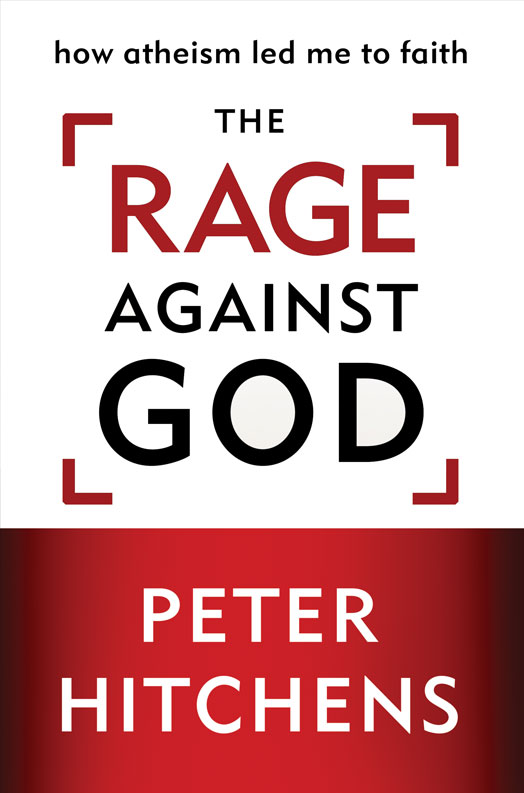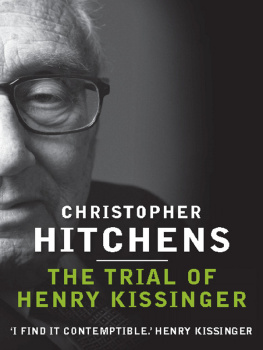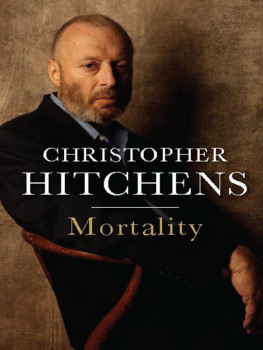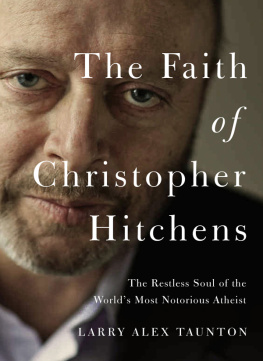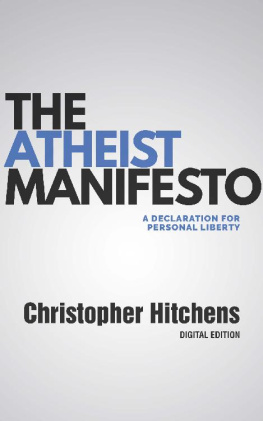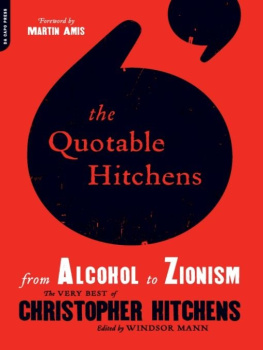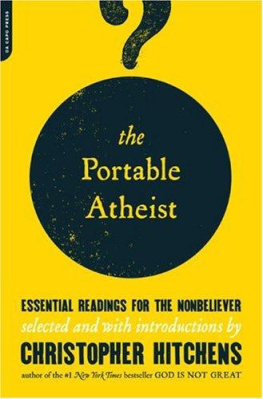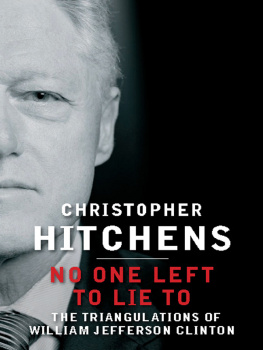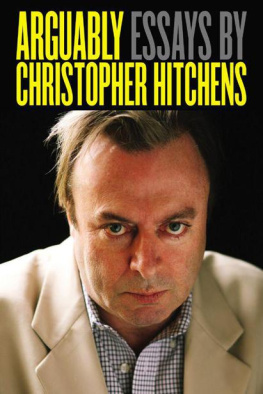ZONDERVAN
The Rage Against God
Copyright 2010 by Peter Hitchens
All rights reserved under International and Pan-American Copyright Conventions. By payment of the required fees, you have been granted the non-exclusive, non-transferable right to access and read the text of this e-book on-screen. No part of this text may be reproduced, transmitted, downloaded, decompiled, reverse engineered, or stored in or introduced into any information storage and retrieval system, in any form or by any means, whether electronic or mechanical, now known or hereinafter invented, without the express written permission of Zondervan.
ePub Edition MARCH 2010 ISBN: 978-0-310-41259-5
Requests for information should be addressed to:
Zondervan, Grand Rapids, Michigan 49530
Library of Congress Cataloging-in-Publication Data
Hitchens, Peter, 1951
The rage against God : how atheism led me to faith / Peter Hitchens. p. cm.
ISBN 978-0-310-32031-9 (hardcover)
1. Apologetics. 2. Christianity and atheism. 3. Hitchens, Peter, 1951
4. Hitchens, Christopher. I. Title.
BT1103.H58 2010
239.7-dc22
2009053282
All Scripture quotations, unless otherwise indicated, are from the Miles Coverdale version of the Bible (1535). Quotations marked KJV are from the King James Version.
Page 72: On Passing the New Menin Gate, from Collected Poems of Siegfried Sassoon, 1918, 1920 by E. P. Dutton; 1936, 1946, 1947, 1948 by Siegfried Sassoon. Used by permission of Viking Penguin, a division of Penguin Group (USA) Inc.
Any Internet addresses (websites, blogs, etc.) and telephone numbers printed in this book are offered as a resource. They are not intended in any way to be or imply an endorsement by Zondervan, nor does Zondervan vouch for the content of these sites and numbers for the life of this book.
10 11 12 13 14 15 16 /DCI/ 21 20 19 18 17 16 15 14 13 12 11 10 9 8 7 6 5 4 3 2 1
Who is this that darkeneth counsel by words without knowledge?
Gird up now thy loins like a man; for I will demand of thee, and answer thou me. Where wast thou when I laid the foundations of the earth? Declare, if thou hast understanding.
Who hath laid the measures thereof, if thou knowest? Or who hath stretched the line upon it? Whereupon are the foundations thereof fastened? Or who laid the corner stone thereof?
(JOB CHAPTER 38)
Thine adversaries roar in the midst of thy congregations.
(THE 74TH PSALM)
O nly one thing comforts me when I look back at the carnival of adolescent petulance, ingratitude, cruelty, and insensitivity that was my Godless period. I was at least not doing it to fit in with the spirit of the age. I held all my radical positions when they were not yet fashionable, and it was necessary to be quite determined, or perhaps just arrogant, to hold them. I got myself disliked and disapproved of by the very kinds of people who nowadays would be orthodox supporters of diversity and secularism, precisely because they are orthodox.
I did what everyone else of my generation was not yet doing. Alas, I still am doing what everyone else in my generation is not yet doing. When I am in church in England now, I notice that it is people of around my age (I was born in 1951) who are mostly absent. There are plenty who are older than seventy or younger than forty, but very few in between. In the United States, I suspect that a great defection of the same kind is now under way in the college generation and that those now in college, or having recently left it, are more hostileor perhaps worse, indifferentto religion than any previous American generation. One orthodoxy is giving way to another, as happened in Britain. To explain this, I will have to explain the curious thing that happened to the Christian religion in my country.
In explaining this, I will describe influences I believe have operated on my brother, Christopher, much as they have affected me. It is not for me to say how similar our experiences may have been. We are separate people who, like many siblings, have lived entirely different lives. But since it is obvious that this book arises out of my attempt to debate religion with him, it would be absurd to pretend that much of what I say here is not intended to counter or undermine arguments he has presented in his own book on this subject.
My book, like all such books, is aimed mainly at myself. All polemical authors seek to persuade themselves above all. I hope the book may also be of some value to others, perhaps to believers whose friends or family members have left Christianity or are leaving it now or are enchanted by the arguments of the anti-religious intellects of our age. What I hope to do in the pages that follow is to explain first of all how I, gently brought up in a loving home and diligently instructed by conscientious teachers, should have come to reject so completely what they said. I had some good reasons for refusing some of it. My mistake was to dispense with it all, indiscriminately. I hope to show that one of the things I was schooled in was not, in fact, religion, but a strange and vulnerable counterfeit of ita counterfeit that can be detected and rejected while yet leaving the genuine truths of Christianity undamaged. That counterfeit still circulates, in several forms, especially in the United States.
I want to explain how I became convinced, by reason and experience, of the necessity and rightness of a form of Christianity that is modest, accommodating, and thoughtfulbut ultimately uncompromising about its vital truth. I hope very much that by doing so, I can at least cause those who consider themselves to be atheists to hesitate over their choice. I also hope to provide Christian readers with insights they can use, the better to understand their unbelieving friends and so perhaps to sow some small seeds of doubt in the minds of those friends.
I then intend to address the fundamental failures of three atheistic arguments. Namely, that conflicts fought in the name of religion are always about religion; that it is ultimately possible to know with confidence what is right and what is wrong without acknowledging the existence of God; and that atheist states are not actually atheist. Beyond this, I harbor no ambitions to mount a comprehensive rebuttal of the arguments of such prominent atheists as Professor Richard Dawkins, author of The God Delusion, or my brother, Christopher.
I am, of course, concerned especially about Christopher. His passion against God, about which he used to say much less, grew more virulent and confident during the years while I was making my gradual, hesitant way back to the altar-rail. As he has become more certain about the non-existence of God, I have become more certain that we cannot know such a thing in the way that we know anything else, and so must choose whether to believe or not. I think it is better by far to believe. I do not seek to thunder as he does, or to answer fury with fury or scorn with scorn. I do not loathe atheists, as Christopher claims to loathe believers. I am not angered by the failure of atheists to see what appears obvious to me. I understand that they see differently. I do think that they have reasons for their belief, as I have reasons for mine, which are the real foundations of this argument. It is my belief that passions as strong as his are more likely to be countered by the unexpected force of poetry, which can ambush the human heart at any time. I am grateful, even so, for the opportunity to challenge his certainties.
It is also my view that, as with all atheists, Christopher is his own chief opponent. As long as he can convince himself, nobody else will persuade him. As I hope I shall make clear, his arguments are to some extent internally coherent and are a sort of explanationif not the best explanationof the world and the universe. Although he often assumes that moral truths are self-evident, attributes purpose to the universe, and swerves dangerously round the problem of consciencewhich surely cannot
Next page
